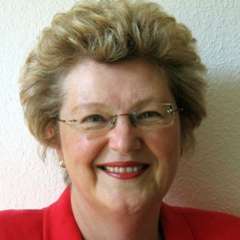Hell need not consist of fire and brimstone. It can also take place in a completely normal, insignificant environment where there is not a bit of human warmth. In Komische Oper Berlin's new production of Kátya Kabanová, director Jetske Mijnssen meticulously takes each role apart in Janáček's psychodramatic masterpiece, pitting family relationships against each other.
The stage is filled with three high-walled rooms with just a table and chairs in each. Imperceptibly, the rooms drift, always revealing a piece of the neighbouring room, and the action takes place therein. Closed-in and claustrophobic, Julia Katharina Berndt's designs sets the mood in the Kabanov house. The entire drama takes place around the tables. The visualisation of this world is supported by Dieuweke van Reij's timeless, dull mid-century costumes. There is no place for fresh air here, no birdsong, certainly no sunshine.
Everyone suffers under the domineering rule of the widow Kabanicha. The son, Tichon, is mercilessly ordered around, he does not have the strength to stand up to his mother. The daughter-in-law, Kátya, has long ago given up and just goes through the motions of daily life. Only the foster daughter Varvara shows a vivacious temperament.
Kátya was portrayed by soprano Annette Dasch with an acting and vocal perfection that was almost frightening. She gave a Kátya who is outwardly calm, a brittle, conventional wife and daughter-in-law who strives for perfection, right down to the exact and precise laying of the tablecloth and the placement of the plates on the dining table. She has surrendered to her fate, but inside she is seething and her emotions explode as she allows herself a small moment of happiness with the handsome Boris. She immediately regrets it. No confession helps, only death. Contrary to the libretto, she does not die by drowning in the nearby Volga River, but quietly, inconsequentially, in the living room. Less is more.
The elegant timbre of tenor Magnus Vigilius suited well as the lover Boris who, as a friend of the family, uses Tichon's absence to indulge in a brief tryst with Kátya. The latter was sung by Stephan Rügamer, whose voice initially displayed a strong vibrato, suiting the characterisation of an insecure man caught between the the role of good son and caring husband.
Equal to Annette Dasch's Kátya was Doris Lamprecht's Kabanicha. She managed to devoid her voice of any warmth or color, leaving only an empty coldness. Has this woman ever felt real love? Probably not. She does allow herself an erotic moment with the elderly Dikoj – a scene which seemed woodenly comic and awkward, and is probably meant to be so. The excellent bass Jens Larsen was convincing as this old family friend and occasional lover.
The smaller supporting roles were also well cast. The young foster daughter Varvara, sung by Karolina Gumos with a friendly and velvety mezzo, served as a counterpoint to the sombre mood that envelopes this disfunctional family. The young teacher Kudrjaš was sung by tenor Timothy Oliver with a fresh verve. Here Janáček shows a halfway normal relationship that will hopefully blossom into real love after the young couples leave for Moscow together at the end of the opera.
Janáček imbues his characters with an emotional speechlessness on stage, which instead finds expression in his music. The highs and lows of Kátya's entire range of despair, as well as those of the other characters, find expression in the score. Lithuanian conductor Giedrė Šlekytė understand these intentions and translates them, leading the Komische Oper orchestra with a direct dynamic and transparency that allowed the opera to unfold its full emotional force.
The Czech libretto was no doubt a challenge for the singers to master but, especially with Janáček, who wrote his score entirely dependant on the music of the language, it was certainly worth the effort and contributed to the international standard here with performance and musical expression going hand in hand. The production was cheered by the audience, even given a standing ovation – a very rare occurrence at the Komische Oper. Instead of a premiere celebration, general director Barrie Kosky gave a short speech directly on stage where he thanked all the performers and also the audience, who kept their masks on for the entire duration of the almost two-hour long opera.




